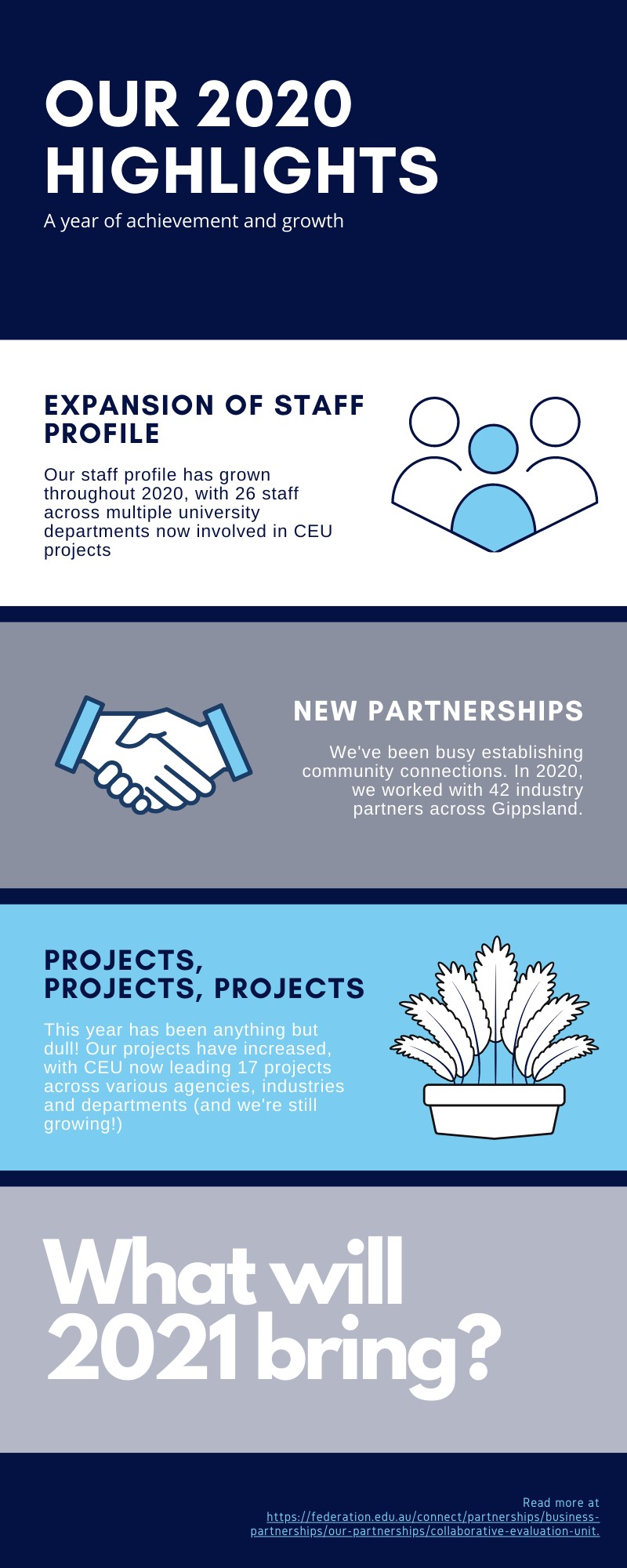CEU Newsletter

Message from the CEU Director, Associate Professor Joanne Porter

The CEU has continued to develop partnerships across the Gippsland region and has recently commenced a number of exciting projects. We are looking forward to working on the nature recovery initiative in East Gippsland, the introduction of the Latrobe Men’s Shed field officer and the commencement of community connectors working in Churchill on the social prescribing project with the Latrobe Health Assembly. Work is ongoing with the Gippsland Primary Health Network evaluating the student led pop up health check clinics around Latrobe, the outreach GP health checks and Latrobe smoking support service. The CEU proudly supported the work conducted by Latrobe Shire who engaged with 100 residents of Latrobe on a community panel to help inform their future strategic plans. The CEU also facilitated a Health sector workshop using a Smart Specialisation approach to develop up future health priorities for Gippsland in partnership with the Latrobe Valley Authority. We are enjoying working with all of our industry partners and will continue to deliver workshops and webinars to support project development, design, evaluation and implementation.
Health Innovation, Transformation and Discovery Workshops
The Collaborative Evaluation Unit (CEU) has partnered with the Latrobe Valley Authority to deliver the Health and Wellbeing stream of the Gippsland Smart Specialisation Strategy (GS3). The Smart Specialisation approach is based on three principals:
- Smart: Identify the regions own strength, comparative and competitive assets
- Specialisation: Prioritise research and innovation in competitive areas
- Strategic: define and develop shared vision for regional innovation
Working in partnership with stakeholders, we’ll be exploring current and future strengths and challenges in the heath sector through a series of six workshops. These workshops will include participants from a number of industries, including education and training experts; key health professionals from a variety of disciplines; representation from Aboriginal and Torres Strait Islander communities; acute health care; health employment agencies; and the higher education sector.
The first of these workshops was held online this month, on Wednesday the 15 September. We were so excited to be facilitating this workshop and to hear from the following inspirational speakers:

You can view videos of the above presentations on our website or by clicking the link below. We can't wait to share more stories about these workshops with you, as we start to move through each phase of the collaborative and evidence-based Discovery, Inquiry and Design process.
Would you like to get involved in Health Innovation, Transformation and Discovery?
We welcome input and would like to hear from you. Email us at: ceu@federation.edu.au

Our projects
Work has commenced on the evaluation of the Latrobe Social Prescribing project. The Hazelwood Health clinic has partnered with the Latrobe Health Assembly to employ two community connectors who will be working with community members to help them become more connected with their local facilities and organisations.
The Social Prescribing project aims to improve the health and wellbeing of local communities and its residents. In addition to the Social Prescribing project, the Latrobe Community Health Service has partnered with Gippsland Primary Health Network to establish the Latrobe Smoking support service which will work with individuals helping them to reduce or quit smoking.
It is so great to see these initiatives up and running. The CEU is proud to be working on these projects, which are making a real difference to the lives of individuals and communities.

Our story
Who are we and why are we here?
The Collaborative Evaluation Unit started after the development of the Latrobe Health Innovation Zone Health and Well Being Charter in 2019. From that project we realised that, more broadly, there was a need for a locally based evaluation unit who could help build local evaluation and research capacity. Our aim is to work in partnership, incorporating a multidisciplinary team approach with expertise across a variety of disciplines to evaluate the effectiveness and impact of community and placed-based projects and initiatives. The CEU has successfully completed a number of evaluations to date and has the ability to respond to the changing environment with collaboration as its core value. We are available for consultations, evaluations and project work and we look forward to working with you in the future.
What do we evaluate and why do you need us?
We evaluate community, government and enterprise projects and programs. We interview staff, analyse data and identify what went well in the project, what needs to be changed and what could be improved. We make actionable recommendations based on our findings and pass all of this information on to you.
Our aim however, is on building the capacity of people in Gippsland. To do this, we make it our priority to work collaboratively with you on each and every evaluation. We want to teach you how to conduct effective interviews, how to analyse and categorise the data. We write the reports, do the research and publish the articles but we also collaborate with you, so you can take these tools with you into the future.
How can we help?
We offer a range of services that we tailor to your needs. We do training, professional development, research, capacity building, and evaluations. We tailor our services to suit you! Contact us today to talk about your project and find out how we can help.
Our workshops
We held our Interviewing Techniques and Analysis workshop on Tuesday the 22 June. This workshop was a fantastic opportunity to learn about interviewing techniques with some amazing tips from experts. Participants got to learn about how to create interview questions, and they also had a go at doing some thematic analysis (which was so much fun!)
Are you interested in attending one of our community workshops? Make sure you stay in the loop and register your interest by sending us an email via the link below
Our projects
#ScreenForMe: Second Birthday and Re-Launch
We were so excited to have attended the #ScreenForMe second birthday and re-launch on the 12 May. This was such a fantastic celebration of all that this campaign has achieved and we look forward to working with the Gippsland Primary Health Network (GPHN) as the program progresses into the next phase. We can't wait to see the impact that Phase 2 of this campaign will have on the Gippsland community and on the continued raising of awareness on the importance of cancer screening.
You can find out more information about the #ScreenForMe campaign and find out how to get involved by checking out their website

Our staff

Dr Vaughan Reimers
The CEU is unique in its ability to access experts in any field from across Federation University. As an academic from the Business School, how did you get started in the CEU?
I think one of the great things that Jo has done with the CEU and one of the advantages that we have over other consultants and evaluation units is that Jo can tap any colleague on the shoulder and say "I've got a specific project and it's perfectly suited to your skill set, do you want to come on board for this specific evaluation?" That's how I got started in the CEU, because I specialize in surveys which are a nearly universal way of evaluating virtually any project. I also specialize in knowing how to collect data and administer the surveys. I encourage and motivate people to complete those surveys, and then analyse the findings. As an academic from the Business School, I come in with a totally different perspective to how a lot of other people see things. They get to see through fresh eyes and it really gets them thinking about that fundamental question; "What value does my organization provide and how is that reflected in the project that we have and then how does that come through in the evaluation?"
As somebody who’s coming from a business background and who’s working in health evaluations, what have been some of the most enlightening or interesting CEU evaluations that you’ve been part of so far?
There have been so many! One of the previous projects I worked on was a mental health campaign and one of the things that was really interesting about the evaluation of that campaign is that we found out its impact on people wasn't just linked through the message that they used, but how often people were exposed to that messaging. That was a really important finding. We found that if these campaigns have messaging that can be used over and over again, the more that people are exposed to that messaging, the more likely it is that those people are going to be influenced by it. I found that was a really interesting project to be a part of. I don't get to work in this space often, if not for the CEU. So that was good, I felt for the first time that my career had meaning.
What are you looking forward to for 2021?
There are some projects that have been going on for two or three years that I'm looking forward to seeing the result of. These are projects that are dealing with cancer screening and getting people to stop smoking, and I'm really looking forward to seeing all that work come to fruition, because I know that when we do an evaluation we’re not just simply telling them what they've done right and wrong. That's not what we do. It's more on the lines of, this is great. This needs to be repeated and this is what else could be done going forward. We’ve put some really good ideas forward in that space and I'm really keen to see how the great organizations that we work with take those ideas and implement them.

Michelle James
How did you get started in the CEU?
I studied psychology at Monash, specializing in alcohol, methamphetamine, opioid and heroin addiction. After that, I took some time off from my studies and stepped away from academia to work in the energy sector. I knew that I wanted to get back into research with the intention of finishing the postgraduate portion of my psych degree and so the CEU was a perfect fit! It allowed me to get back into that academia space but also, it allowed me to utilise my psychology background and apply this knowledge to various mental health and community wellbeing projects.
What are you currently working on?
With my background in psychology, I'm involved in any projects that have a mental health or community health focus. Some of those projects include the Gippsland Primary Health Network (GPHN) Pitch to Quit and Screen For Me campaigns. These projects have a real mental health or community health focus. I'm also working on a project called Social Prescribing, which is the idea of offering alternative therapies for people who go to the doctor for issues that aren't necessarily medical related. Throughout COVID, a lot of people have been really lonely, and it's good that people go to the doctor for that rather than doing nothing, but doctors also need to be able to refer them on. Doctors can't be all over every community initiative or organisation that's open at the moment, so it's an amazing additional resource for them and for the community.
What's your favourite thing about working in the CEU?
I love the idea that we make an impact. I did psychology because I wanted to make an impact in people’s lives and this work aligns so well with that. Because what we do does make an impact, you can see at the end how evaluation helps to either improve these programs or enable them to continue. We're actually making a difference. It's the projects themselves that are influencing people and the community more so, but we're helping to enable the projects to continue and to identify ways in which they might be able to make an even bigger impact in the future. To have the university backing us as well, means that we can distribute that knowledge to the world. To be able to publish on a program like Pitch to Quit or Screen For Me, you open doors for that project to be repeated in other places.
What are you looking forward to for 2021?
I'm not published yet, and my biggest ambition is to get one paper (which goes back to that idea of disseminating information), but I'm also looking forward to being back in the office and out in the community again. The data we gather is so much richer when we can actually get out and talk to people. To get that more casual interaction is when people are often really comfortable to speak their mind and you get really amazing feedback, so I'm looking forward to getting back into that and running focus groups again.
Our projects
We're so proud to have released the findings from our evaluation of the 'I Am Ready' program alongside Baw Baw Latrobe LLEN and the National Disability Coordination Officer (NDCO) at the evaluation launch on Tuesday the 27th of April. This was such a fantastic event and we're so happy to release this report.
The CEU evaluation of the ‘I Am Ready’ Program sought to ascertain the impact of the program on the preparedness to seek future employment of participating Year 10, 11 and 12 students with mild intellectual or learning barriers.
|
|
|
|
Message from the CEU Director Associate Professor Joanne PorterThe Collaborative Evaluation Unit (CEU) is excited to commence 2021, working with existing partners while also starting some innovative new evaluation projects. The CEU will be once more working closely with the Latrobe Health Assembly (LHA) the Department of Health and Human Services (DHHS) on local projects to improve the lives of residents in Latrobe and throughout Gippsland. A significant body of work will be done on evaluating the establishment of a smoking cessation clinic, social prescribing worker and activities with Gippsport to increase access to sport and get Latrobe active again. Watch out for evaluation and research workshops, the CEU will be running a series of interactive practical sessions focusing on skills related to research and evaluation such as interviewing techniques, thematic and content analysis, advanced statistical analysis, and developing SMART objectives etc. We look forward to working with you collaboratively in 2021.
We want to provide you with content that you can't wait to read. To do this, we want to know what you'd like to see in our upcoming newsletters! Click the link below to complete our short (2min) survey and let us know what you think. We want to hear from you - Click here!
Curious about what we do and how we can help you in 2021? Get in touch by emailing us at ceu@federation.edu.au to start the conversation About usThe Collaborative Evaluation Unit (CEU) is an innovative initiative that aims to build evaluation capacity, research and expertise in Gippsland. As a local provider, the CEU understands the value of listening to the community and has the ability to deliver timely, rigorous and sustainable evaluations tailored to the needs of a wide variety of organisations. The CEU provides training, workshops and mentoring to build capacity to enable organisations to conduct meaningful evaluations. |
Message from the CEU Director Associate Professor Joanne Porter
2020 has brought with it a number of challenges for all, the most significant was the inability to meet face to face with evaluation partners. The CEU has worked hard to ensure we approach every evaluation as an opportunity to learn, work collaboratively and show case the wonderful work that is occurring
right across Gippsland. There have been a number of significant evaluations this year, we would like to thank our industry partners on giving the CEU the opportunity to work with you and we are looking forward to future collaborations. As the new year dawns we are looking forward to once again providing
Gippsland with webinars and workshops to build local evaluation and research capacity.
Our projects
Gippsland Aboriginal Advocacy Support Services (GAASS)
The CEU have been working with Gippsland Aboriginal Advocacy Support Services (GAASS) to evaluate the training provided to staff, in preparation for supporting local Aboriginal people who are seeking and applying for National Disability Insurance Scheme (NDIS) services.
GAASS put people and community at the center of everything that they do and we’ve been so inspired listening to GAASS employees and hearing the incredible passion and dedication that they have for their work. Below are some photos from our time working with GAASS.
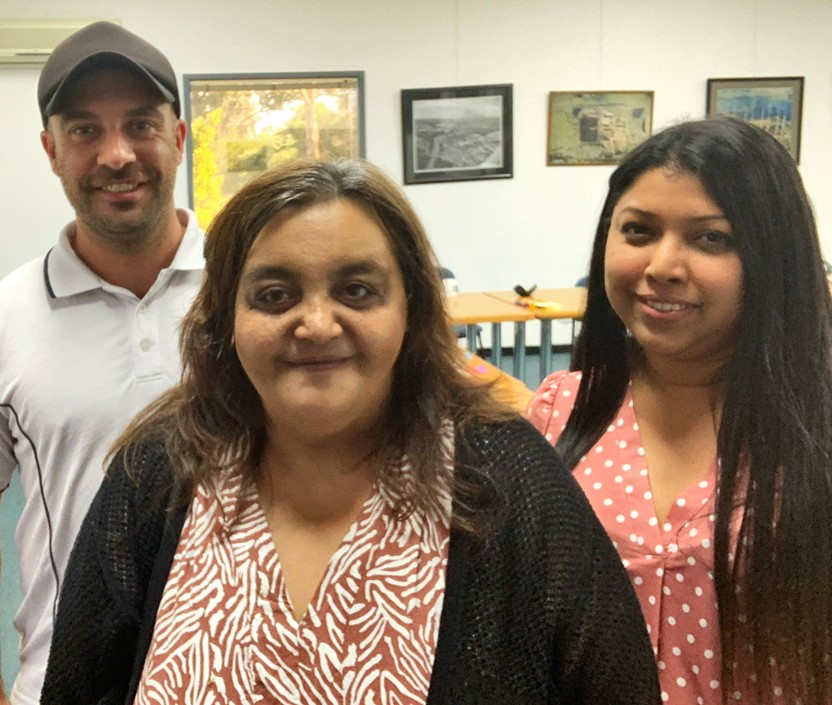 | 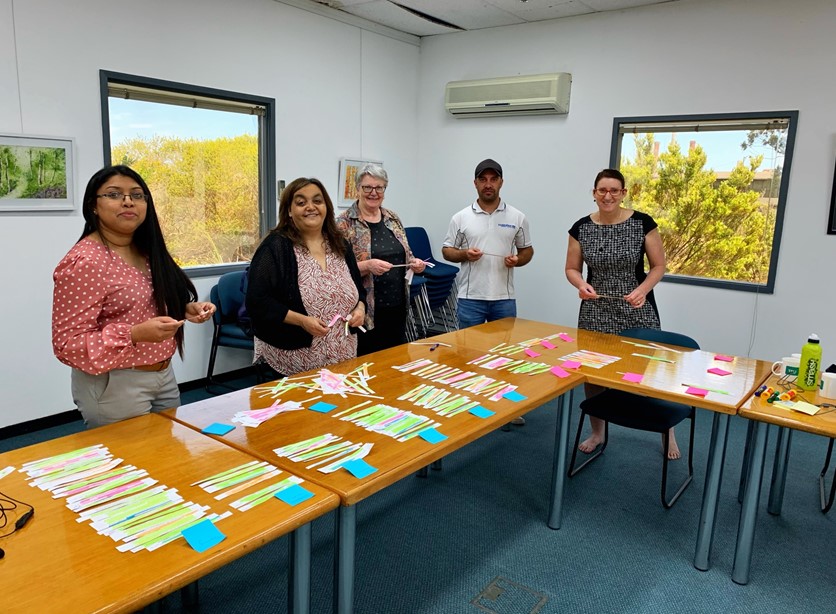 |
'I Am Ready Program'
 The ‘I Am Ready’ program, a project by the Baw Baw Latrobe (LLEN), East Gippsland LLEN, South Gippsland Bass Coast (LLEN) and National Disability Coordination Officer Program (NDCO), enabled young people
The ‘I Am Ready’ program, a project by the Baw Baw Latrobe (LLEN), East Gippsland LLEN, South Gippsland Bass Coast (LLEN) and National Disability Coordination Officer Program (NDCO), enabled young people
with a disability to gain knowledge, skills and opportunities to help them secure meaningful employment, further education and training. ‘I Am Ready’ supported Gippsland secondary school students and acted as a transition program, to give them a variety of skills in areas such as work readiness, gaining
confidence, self-direction and empowerment.
We worked with the LLEN to evaluate the ‘I Am Ready’ program, and broke down our key findings into the following categories; reach of the program, lessons learnt, breaking down barriers, building confidence and bright future for participants and the program.
This project highlighted transition
programs as a resource to empower people with barriers in accessing meaningful work or further education. The support provided through these programs and the use of mentors and face to face delivery, can improve the skills of people with barriers and empower them to achieve their goals and aspirations.
Emerging Practice
COVID-19 has changed many of the ways that we deliver and receive essential services. For service organisations, this means that staff needed to adapt quickly and innovatively to a variety of rapid changes to the way that they deliver services. To investigate this a bit further, we partnered with the
Latrobe Health Assembly (LHA) and the Department of Human Services (DHS), to complete a first stage rapid evaluation and analyse how effective Gippsland service organisations were in adapting and implementing these changes to service delivery (in line with COVID-19 restrictions), and to see how staff
were effected by and responded to these.To complete this evaluation, we interviewed a group of participants who represented 42 different organisations across Gippsland. In speaking to participants, we found that many services were being rapidly moved to an online delivery model, which required essential
training and skills development for staff so they felt comfortable delivering services effectively. A hybrid model was suggested for future service delivery, particularly in organisations that were able to prepare their staff, provide the relevant infrastructure, provide comprehensive training and who
were able to work in partnership with their clients; to ensure their service needs were also being met.
COVID-19 has presented unique challenges and changes for all of us this year, with quite a few of those being in the workplace. Here are some of the recommendations from participants about how these service delivery changes might be better supported and further developed in the future:
- Adequately resource staff in order to implement virtual service delivery.
- Provide essential training and skill acquisition for staff.
- Organisational flexibility to accommodate a variety of work environments.
Further research to explore the impact of the changes to service delivery on the client experience, health outcomes and work productivity.
Pitch to Quit
Pitch to Quit is a Latrobe Valley based competition, asking community members to pitch an idea which will be turned into a media campaign to encourage people to quit smoking. An initiative of the Latrobe Health Innovation Zone and Gippsland Primary Health Network (GPHN), Pitch to Quit ran for the second
time in 2020 with judging conducted by representatives from Gippsland PHN, Quit Victoria, the Latrobe Health Assembly, and media and graphic design experts from the local community.
Our evaluation focused on the experiences of the finalists and judges of the Pitch to Quit competition, with the second stage of the evaluation following the Pitch to Quit winner through the creation, completion and distribution of their campaign. In the first stage of the evaluation, we found
that the Pitch to Quit campaign was a fantastic way for community to be involved in a community health campaign. The collaborative approach of the campaign design and theme was viewed as innovative and successful for those involved and although a few changes had been introduced since the 2019 campaign,
most of these changes were seen to be positive ones. The competition even provided the opportunity for one community member to develop their advertising and film making skills!
Keep an eye on our upcoming newsletters for updates on the second stage of this amazing project.
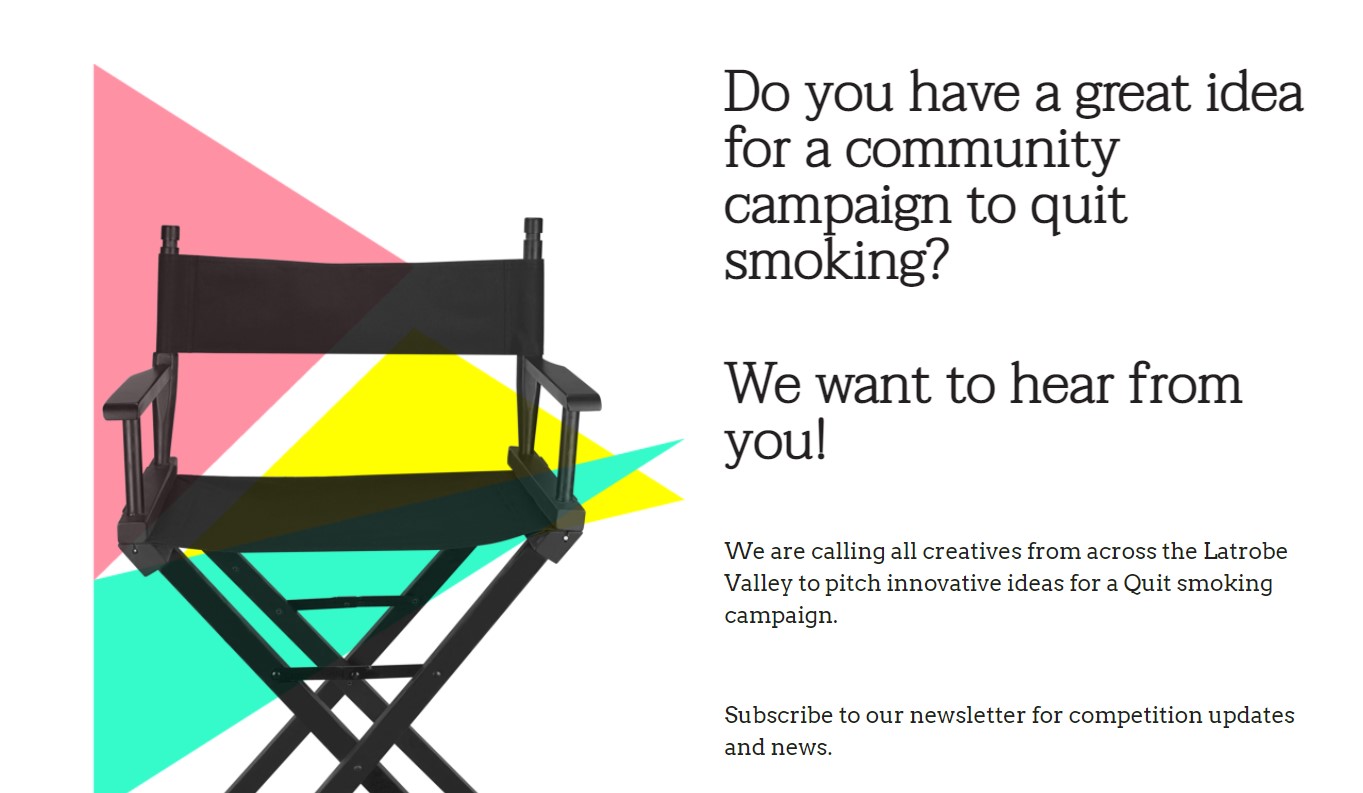
Our staff
Elissa Dabkowski
How did you get started in the CEU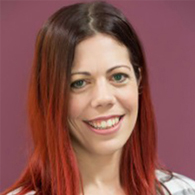
I had just successfully completed my Honour’s thesis titled, “The efficacy of a community-based exercise program on the health and well-being of ageing adults: A qualitative study.” This thesis formed part of an evaluation for the FRRR Health and Wellness program in Yinnar, which was completed by the CEU. I loved working with my two Honours supervisors
Jo and Michael and when the opportunity to work with the CEU came up I jumped at the chance! I currently work one day a week with the CEU and I also work as a nurse in the emergency department of Latrobe Regional Hospital. There’s a saying that goes “Choose a job you love, and you will never have to work a day in your life.”
This is exactly how I feel about research! To me, it is fun and exciting and I feel very lucky to be part of the CEU.
What are you currently working on?
At the moment, I’m working with Jo in finalising the evaluation of the Zero Suicide project. This has been such a great project and I’m looking forward to seeing the finished results. I’m also working with a great evaluation team on the Make Your Move Latrobe/Increasing Access to Sport evaluation in collaboration with GippSport. We
are on track to having this three-part evaluation completed by June 2021. I’m sure there’ll be many other projects that I will be part of in 2021 but for now this is certainly keeping me busy!
What's your favourite thing about working for CEU?
100% the people I work with! We are such an eclectic group of people with different backgrounds and we all bring a different skillset to the CEU. I feel very honoured to be working alongside such esteemed colleagues and it is never a dull moment working in the CEU! We also have the pleasure of meeting
wonderful people from both industry and out in the community who have achieved amazing things. I love hearing people’s stories; everyone is so unique!
What are you looking forward to for 2021?
We have a lot happening, it’s truly exciting times for all of us! I can’t wait to see the new projects that come our way in 2021. I’ll be looking forward to seeing the progress and outcome of the Make Your Move project, which will be finished by June 2021. I’m also looking forward to seeing our research in international and national publications. On a personal note, I’ll be commencing a PhD in 2021, so I’m excited for the upcoming challenges ahead.
Paul Kemel
How did you get started in the CEU?
I got a lecturer position with the University setting up the physiotherapy program that's gonna 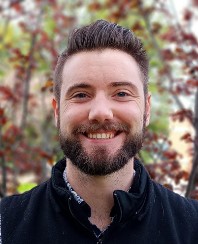 be rolling out next year. My background's mainly in clinical and this was my first academic role. The CEU Streetgames evaluation fit really nicely as I'm quite passionate about youth
be rolling out next year. My background's mainly in clinical and this was my first academic role. The CEU Streetgames evaluation fit really nicely as I'm quite passionate about youth
sport participation. Moving into academia, there's an opportunity to have an input into projects that have a bigger scope and have a much bigger, grander impact, so I thought this was a nice project to get my teeth sunk into. Using my background as a clinical sports physiotherapist, I
think it's blended my two areas quite nicely; what I wanted to achieve versus what I've done in the past. With what I've done in the past, there's been always a research component as physiotherapy is very evidence based practice. But I wanted to learn how to do better research, so getting the
opportunity to be involved in a community sport program and evaluating that, it was an easy decision for me to say yes.
I'm also currently enrolled in the Master of Health Program and Jo's been a fantastic supervisor. The projects in the CEU are definitely having
a look at that community impact and it feels good to know that the research that you're contributing to is hopefully having a bigger impact, more so than just at the individual level.
What are you currently working on?
So we're in the midst of data collection and the report write-up phase for the Streetgames evaluation. I did phase one, which was looking at the covid transition where they had to deliver the program online. I looked at it from a qualitative point of view, so
I did some interviews with some of the participants which was really, really engaging - you could see the passion that the guys had for the program was just absolutely incredible. And then looking at quantitative components, so we sent out a survey and are getting some interesting results
from that as well. It's interesting because it's a unique snapshot in time. The Streetgames program itself is probably not going to be entirely delivered online into the future, but it's advising Gippsport about what lessons can be learned from it, while also taking
a step back and looking at it from a wider community point of view. You had these participants, a young adult adolescent population, and you look at the impact of covid on them. It'll be interesting to see how this research and how what we've found, will tie into similar future studies
and whether or not we can undo the effect of the covid lock-down and how long that is going to take.
What's your favourite thing about working for the CEU?
When I took on this academic role I was doing it knowing the limitations of what I could do from a physio side, from a clinician side. In that role, you're limited to the 30 or 40 individuals that you treat per week, and even across a year you might only see X number
of patients. As much as I love doing that and helping people in the individual setting, I wanted to contribute to something bigger. I felt like these projects would have a bigger impact than what I can just do from a one on one setting. Streetgames was a perfect fit for me. It's an amazing
program. The concept; that free sport participation and removing the barriers that some people have in terms of participating. It's trying to influence further upstream effects because we know how important physical activity is in terms of academic performance, in terms of mental
health. That has the ability to change peoples lives long term. That's the type of impact you can't really have in a clinical setting.
What are you looking forward to for 2021?
We'll be delivering the Physio program for the first time next year, so my head space will probably be a lot into that 'cause I'm coordinating the physio specific course. I'll also be finishing up this report for the CEU and finishing off the thesis component of my
degree. And then we've got a couple of other projects that are looking at a transition to practice for allied health, so we'll see how that goes as well. That's my plans for 2021 (and move into my new house which will be nice). It's been a great experience working with the CEU and learning
from Jo this year. She's definitely a good mentor to have, so whenever she needs my help, I'll be there! 